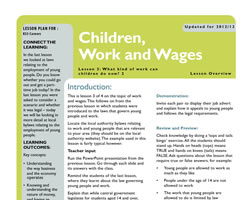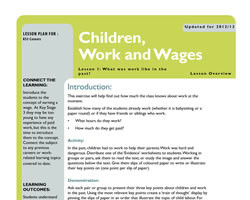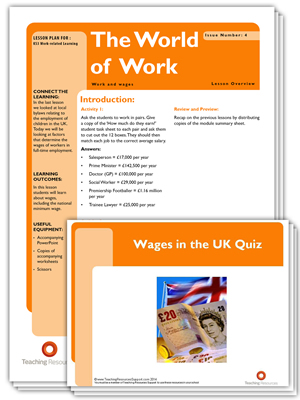Careers Lesson Plans / KS3 - Work and wages - 4 lessons
KS3 - Work and wages - 4 lessons
4 lessons introducing the topic of work, wages, the minimum wage, and explores the history of children and work.
A series of teaching resources that include worksheets, student activities and PowerPoint presentations. Each lesson encourages individual, group and class work.

This lesson follows on from the previous one and involves the students creating a job advert that follows the legal requirements for young people and work.
-
 TRS Careers Wages Lesson 3 PDF
TRS Careers Wages Lesson 3 PDF
-
 TRS Careers Wages Lesson 3 PPT
TRS Careers Wages Lesson 3 PPT

In this lesson students are introduced to the laws that limit the kind of work that young people can do.
-
 TRS Careers Wages Lesson 2 PDF
TRS Careers Wages Lesson 2 PDF
-
 TRS Careers Wages Lesson 2 PPT
TRS Careers Wages Lesson 2 PPT
-
 TRS Careers Wages Lesson 1 PDF
TRS Careers Wages Lesson 1 PDF
-
 TRS Careers Wages Lesson 1 PPT
TRS Careers Wages Lesson 1 PPT
-
 TRS Careers Wages Lesson 4 PDF
TRS Careers Wages Lesson 4 PDF
-
 TRS Careers Wages Lesson 4 PPT
TRS Careers Wages Lesson 4 PPT
Work & Wages Lesson Plans
When thinking about their future options and career paths, it is important that students understand how the world of work has changed. In this series of teaching plans, we work our way through history looking at the types of work carried out by children.
Lesson 1 – What Was Work Like In The Past?
A series of activities that look at evidence about the working conditions of children from history. Students also reflect on the topic of child labour.
Lesson 2 – What Kind of Work Can Children Do Now? - Part 1
In lesson 2, students must study and interpret elements of the Children and Young Persons Act 1993 and outline their key findings. Working in groups, they must present their work to the rest of the class.
Lesson 3 – What Kind of Work Can Children Do Now ? – Part 2
Now that students have a basic understanding of the laws relating to the type of work they are permitted to do, they must now look more closely at their local bylaws and prepare an advert for a job suitable for their peers.
Lesson 4 – Minimum Wage
In the last lesson in this module, we look at the minimum wage for young people, careers which have the highest paid employees and other financial factors including benefits etc.
Vocational Qualifications
These work and wages lessons can be used to support learning outcomes for Preparation for Working Life - Changing World of Work, Economic and Financial Aspects of Life from AQA. These lessons are also suitable for use with Personal and Social Development Qualification - Managing Own Money from ASDAN; Key Skills and Workplace Core Skills - Managing your Own Money from City & Guilds; Skills Towards Enabling Progression "Step Up" - Personal Budgeting, Economic Well-Being and Financial Capability - Budgeting and Money Management, Changing Patterns of Work, Pay and Payslips, Developing Skills for Employment - Financial Literacy and Money Management, Work Related Aspects of Citizenship from NOCN; Employability Skills - Financial Capability from OCR.



